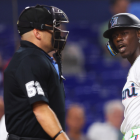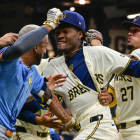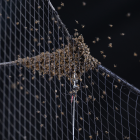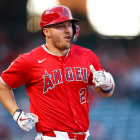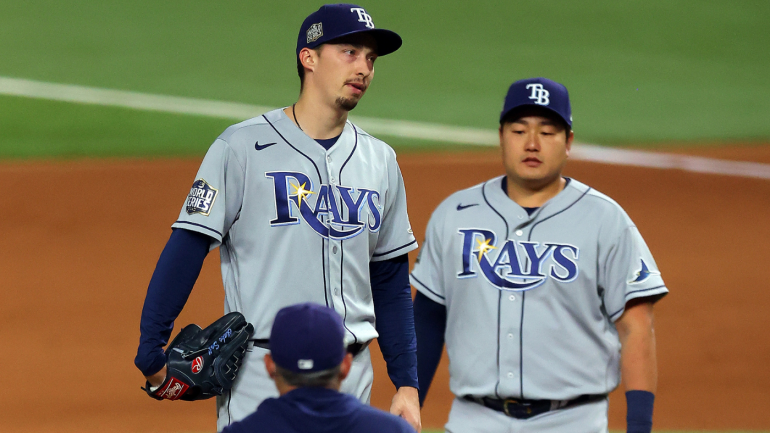
Welcome to the discussion -- related to on-field matters, at least -- that could dominate baseball world for a decent portion of the offseason. It's a discussion that'll be happening years down the line, especially when the World Series is being played and decisions on when to pull starting pitchers are discussed.
That's because what looks like an early hook might have cost the Rays the World Series in their season-ending Game 6 loss on Tuesday night.
Through five innings of World Series Game 6 with the Rays facing elimination, starting pitcher Blake Snell had done absolutely everything his team could've asked of him. He had allowed just one hit (a single) without walking anyone while striking out nine. Most contact was soft. Only two balls had left the infield (Chris Taylor's single and a routine fly out).
Snell recorded a pop out to start the sixth and then gave up an Austin Barnes single.
Rays manager Kevin Cash then had a decision to make. The Rays tend to avoid the third time through the batting order with their starters. That includes Snell, who hadn't completed six innings in a start since July 21, 2019. We've preached for years about how much hitters hit pitchers harder the third time through the order.
And yet, Snell was making the Dodgers look absolutely foolish. The next three hitters were the top of L.A.'s order: Mookie Betts, Corey Seager and Justin Turner. They had each struck out twice in two tries against Snell in Game 6. Snell was only at 73 pitches due to how efficiently dominant he had been.
Cash elected to go to Nick Anderson, who was arguably the best reliever in baseball during the regular season.
Anderson had also given up at least one run in his last six outings this postseason. In that stretch, he's pitched to a 6.52 ERA while allowing opposing hitters to slash .342/.405/.605 against him. He struck out five and walked four in 9 2/3 innings. In the regular season, it was 26 strikeouts and three walks in 16 1/3 innings. Something clearly wasn't right for Anderson in October.
Meantime, the Dodgers fans in attendance were thrilled with the pitching change. The Dodgers' dugout seemed to have perked up too, and can you blame them? They were being totally owned by Snell and now they had a guy they'd been hitting. Enter Mr. Betts with a rocket double down the left-field line. We found out after the game that Betts was relieved at the pitching change.
"I was like, 'whew, thank you.'" Betts said in an interview on MLB Network. "He was rolling. He was pitching a fantastic game. I'm not exactly sure why (he was pulled), I'm not gonna ask any questions. I'm just gonna be happy that we're winners."
Now, remember how I said Anderson hadn't been right? He threw zero wild pitchers in the regular season, but uncorked one to Seager. Barnes scored, and Betts moved to third. Then Seager hit a grounder and Betts beat the throw home. Just like that, it was 2-1 Dodgers after feeling so helpless against Snell.
Here's everything that happened after Blake Snell was pulled:
— FOX Sports: MLB (@MLBONFOX) October 28, 2020
- Mookie Betts double
- Run scores on Wild Pitch
- RBI infield single, Dodgers take lead pic.twitter.com/lwVnoeA7P0
Anderson's streak of seven straight outings allowing a run in postseason games is now a record.
"Didn't want Mookie or Seager seeing Blake a third time," Cash said after the game. "There was no set plan. As much as people think, there's no set plan."
We have no idea how things turn out with Snell staying in the game. Perhaps Betts homers and then the Rays are kicking themselves for straying from what seemed like an obvious plan of not allowing Snell a third time through if the game hung in the balance.
It's fair of Cash to say there's no set plan, but every action here and even the first part of Cash's comments make it seem like there is a set plan. Cash also mentioned that Betts was coming up a third time and that they felt Snell had already done his job. Again, that seems like a set plan.
If it wasn't, why didn't he just keep riding Snell? He was dominating the game. He had already twice owned the two hitters he mentioned in the quote. It really seems like the directive here from the Rays' decision-makers, Cash included, was to get Snell through the order twice and only keep going if there was no chance he could blow the lead.
Snell discussed the situation after the game. "I did everything I could to stay in that game," he said (via Marc Topkin of the Tampa Bay Times). "I know it's third time through ... but I believe in me.''
Snell also kind of had his manager's back by telling reporters Cash is usually correct in these decisions and that we wouldn't be talking about it if the Dodgers didn't score. Center fielder Kevin Kiermaier didn't seem enthused with the move, though.
Kiermaier on Snell decision:
— David Lennon (@DPLennon) October 28, 2020
“I don’t really care what the numbers say - third time through the order, whatever. There wasn’t many guys making contact in general and no hard contact whatsoever. I think we all wanted to see him stay in there.” #Rays
Kiermaier also said he and the teammates he's apparently referencing thought Snell could've gone another two or three innings.
As noted, we don't know what would've happened if Snell stayed in the game. We do know what happened after Snell was pulled, though. The lead was made into a deficit within six pitches. They lost the game, 3-1, and the series in six games. Whether one believes it was the right decision or not, it's a decision that will be permanently embedded in World Series lore.
















